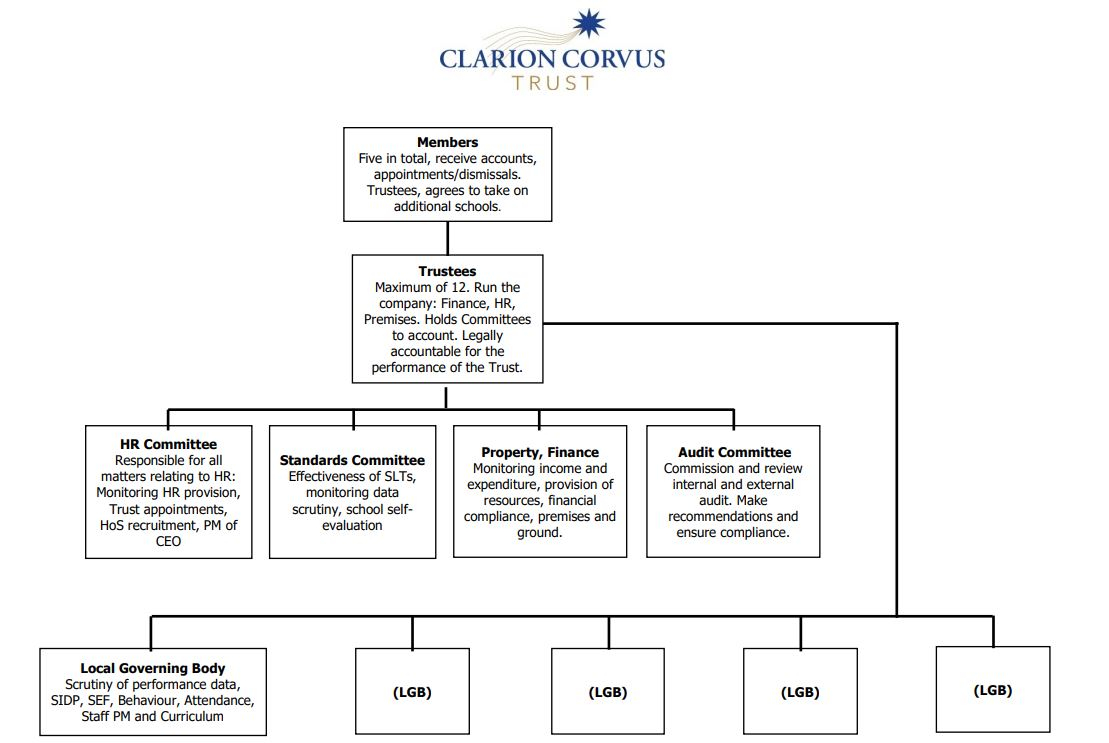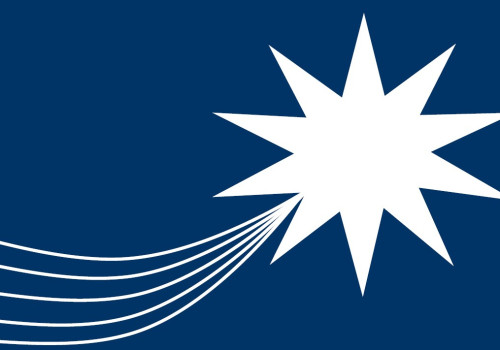
Governance
| The Chief Executive Officer (CEO) is Jim Adams |
|---|
Strong governance is a key feature of the way the Trust works.

If you would like to contact the Clerk to the Trustees and Governing Bodies, please email clerktogov@clarionacademytrust.org.uk
The Clarion Corvus Trust is a charitable company limited by guarantee. Like all academy trusts it is regulated by the Education Funding Agency (EFA) on behalf of the Secretary of State for Education (DfE). Clarion Corvus Trust is a Multi Academy Trust (MAT) as it consists of more than one school.
The individuals sitting on the Trust Board are both charity trustees and company directors. The EFA states that the Trust Board are “the people responsible under the academy trusts articles of association for controlling its management and administration. They have responsibility for directing its affairs, and for ensuring that it is solvent, well run and delivering the trust’s charitable outcomes for the benefit of the public.”
The Trust Board is accountable to Trust Members who ultimately control the company and have the power to appoint and ultimately remove some trustees. Trust Members have a key role providing assurance that appropriate governance structures are in place. Distinct and independent their role is to provide oversight and challenge.
MATs are subject to two governing documents:
- The Funding Agreement, which is the legal contract between the MAT and the DfE and is administered by the Education Funding Agency (EFA). There are supplementary agreements with each academy school within the Trust.
- The Articles of Association, which set out the charitable objectives of the trust, the governance composition and its overarching procedures.
- In addition the Trust is subject to:
- The Education (Independent Schools Standards) Regulations 2014, which set out requirements relating to curriculum and conduct of schools.
- The DfE Governance Handbook which provides guidance and advice that MATs should follow.
- External Assurance. As well as reviewing data from individual schools, the Trust Board seeks external assurance and this will include independent financial and other audits. Individual Trust schools are subject to periodic inspections by the Office for Standards in Education (Ofsted).
Within this context Trustees of the Board are responsible for establishing the Strategic Aims and Objectives of the Trust and for the proper governance of all its schools collaborating with LGB’s and all staff to ensure trust objectives are delivered.
In order to discharge their responsibilities, the Trust Board has adopted a code of conduct, in line with good practice within the charitable sector.
All Trustees must sign a declaration of interests and this is published on our website.
All MATs are required to appoint a single senior executive leader who acts as an accounting officer and as such is held to account by the board of trustees. The Trust has appointed a CEO to undertake these duties with two key areas of responsibility:
- to provide leadership to the charity and be responsible for the management and administration of the charity within its strategic, policy and accountability frameworks as laid down by the board of trustees
- together with the Chair, to enable the Trust Board to fulfil its duties and responsibilities for proper governance and to ensure the board receives timely and appropriate information on all relevant matters.




The Trust Board delegates many specific functions to Committees, CEO, senior staff and Local Governing Bodies (LGB’s). This is set out in a Scheme of Delegation Document and is published on the Trust website.
The relationship between the Trust Board and Local Governing Bodies (LGB’s) is particularly important. In accordance with the Scheme of Delegation, working within agreed trust policies and in partnership with the Trust Board and other Trust schools, LGB’s will:
- Develop a clear understanding of how their school is led and managed
- Provide oversight and scrutiny of the curriculum, standards and performance
- Determine and review delegated school policies
- Engage with all school stakeholders including students, parents/carers, staff members and act as a point of consultation and representation
- Monitor the agreed targets within the School Improvement and Development Plan
- Champion school improvement and extra-curricular activities
- Promote equality, good relations and diversity aimed at raising standards for all children
- Maintain an overview of overall risk including health and safety, child protection, safeguarding and pupil welfare, equality and staff well-being together with the standard and provision of facilities and the management of school projects
- Support the CEO in the Performance Review of the Exec Headteacher, Head of School or Headteacher.
We recognise the expertise and commitment of local governors and the value they add by monitoring performance, providing challenge and giving support. We understand that some issues and decisions must be addressed by the Trust but that the majority of decisions for individual Academies are best made by Local Governing Bodies.
Governance Model







